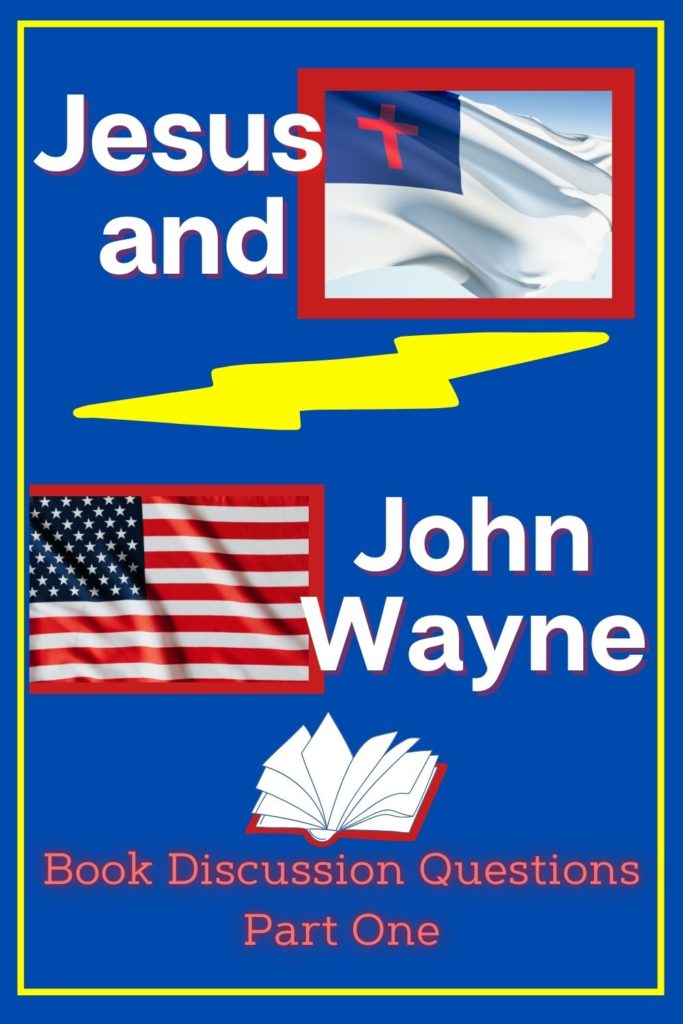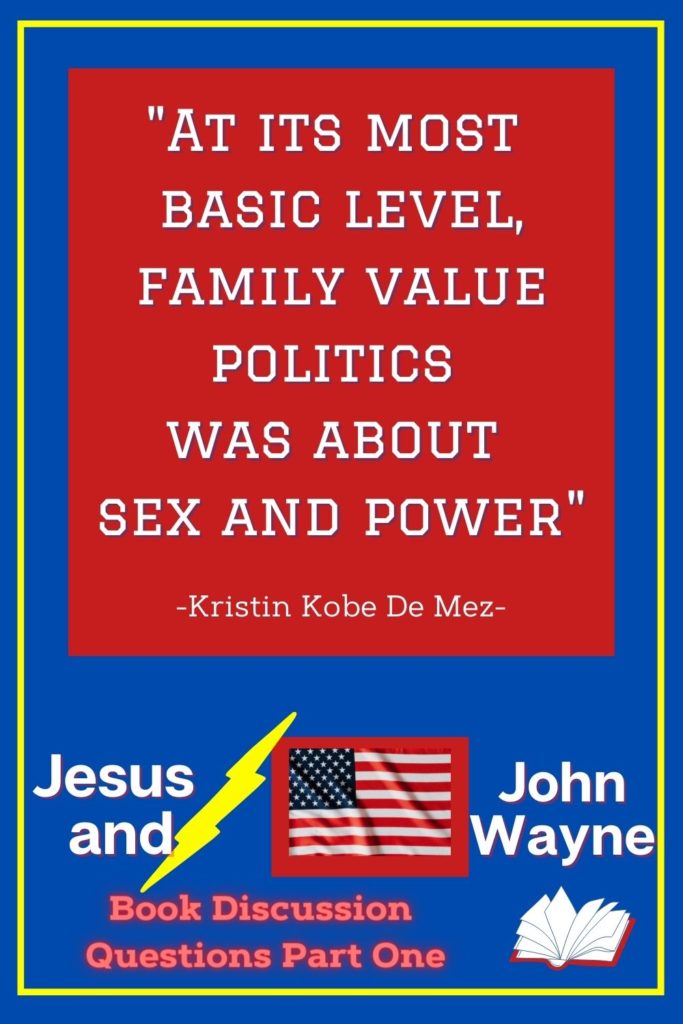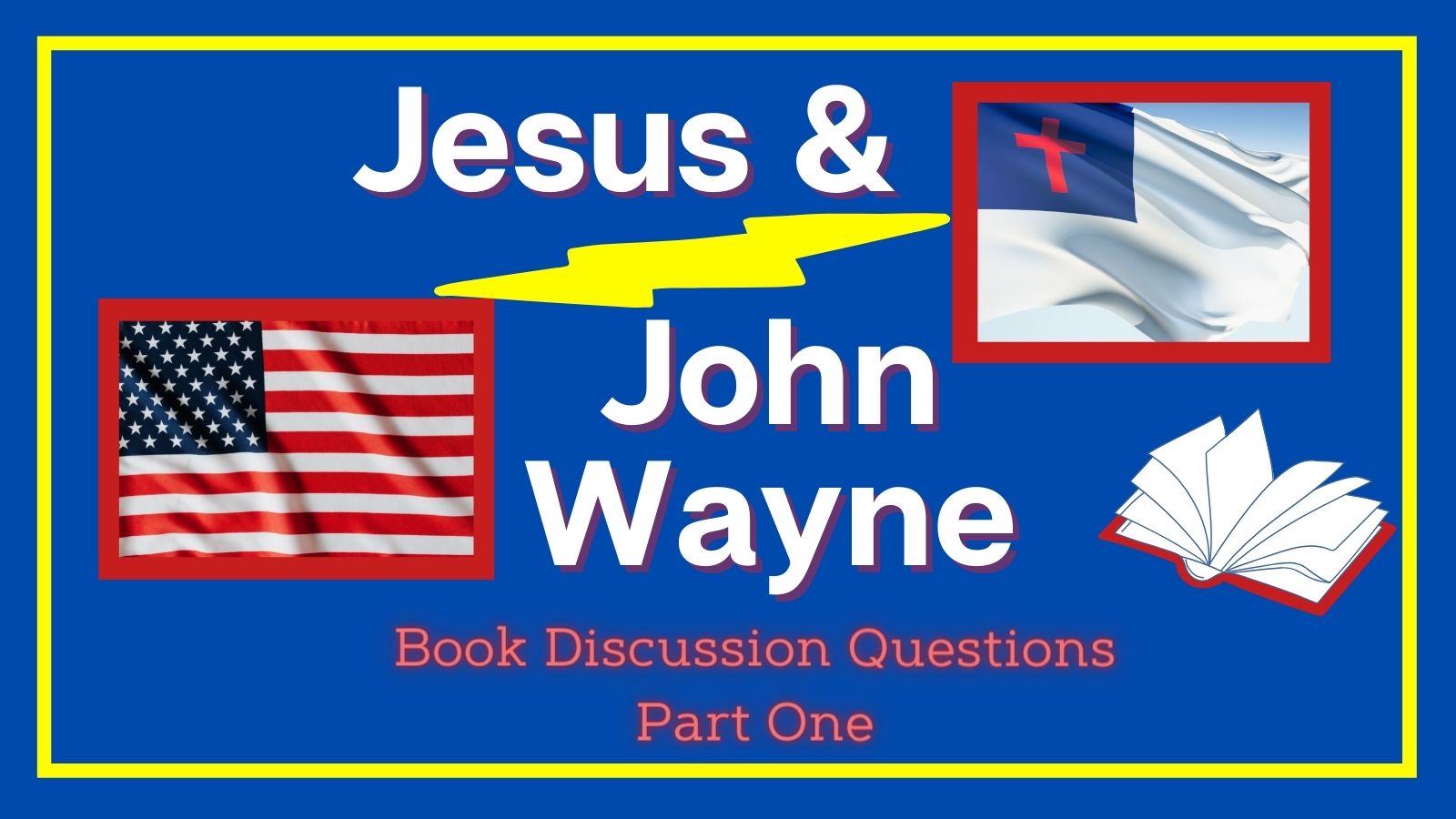Jesus and John Wayne Book Discussion Questions Part One written by the Hobbit on 8/2021. This post contains affiliate links, you can find out more on our policies page or in the disclaimer at the bottom of the blog.
Know Before You Read Jesus and John Wayne
Book: Jesus and John Wayne: How White Evangelicals Corrupted a Faith and Fractured a Nation
Author: Kristin Kobes Du Mez
Genre: History, American history, Christian history
Length: 365 pages
Age suggested:18+
Release Date: June 23, 2020
Themes: Militant masculinity, toxic masculinity, Christian nationalism
Warnings: This book might be a difficult read if you are not sure if nationalism or toxic masculinity are issues in the church. It might be triggering if you have suffered church abuse or rejection as well.
This post covers chapters 1-7. Check out our second post that covers the rest of the book- Jesus and John Wayne Discussion Questions part 2
Quick Jesus and John Wayne Summary
Over fifty years, a belief was fostered that pervades a majority of white evangelical thinking – our churches and country’s flourishing depend on aggressive male leadership. Du Mez traces how this has happened, the horrific effects of pervasive abusive patterns within the church, and the impact this has had on American culture at large. It’s a fascinating read and I kept asking myself how these views have impacted my beliefs and actions.
–Why Read Jesus and John Wayne –
A lot of attention has been paid over the past few years to the rise of the “nones”, those who have no religious affiliation. Ryan Burge has a book on this The Nones: Who They Are and Where They Came From. The numbers of those identifying as white evangelical have been dropping, and, as the title indicates, divides have opened within white evangelicalism that have become impossible to ignore. Regardless of where you fall on the issues discussed, if we are going to understand what has happened and is happening in the white evangelical church one of the major factors we need to understand is why a pattern of aggressive, militant male leadership arose, and what has sustained it. Jesus and John Wayne is an important book to aid in this effort.
General note: Du Mez’s original intended audience was not Christians. It was written to explain the current state of Christianity to non-Christians in a historical way. It has, however, found a huge audience within Christianity. We similarly hope that this review will be of use regardless of your personal beliefs.
Many theologians, historians, etc., believe that when we say “evangelical” in the United States it has lost most of its theological meaning, and is instead now more cultural. Du Mez would agree with this. She identifies evangelical as a term that refers to associations and to specific consumer culture. There are thoughtful churches that do not fit the pattern.
Unfortunately, the evangelical subculture affects the majority of white evangelical churches to some extent and thus the issues in the pages of this book can be found in many churches that identify as evangelical. Speaking as someone who grew up and has lived most of my life in the evangelical subculture, I found the book to be eye-opening. It helped me make sense of things that I have seen happening over the past 40 or so years.
Jesus and John Wayne Book Discussion Questions and Chapter Reviews
**The author, Kristin Kobes Du Mez, has a study guide for the book with videos and some discussion questions here as well!**
Introduction: The Introduction provides an overview (and may tell you if you are going to be open to reading the rest of the book). Some questions to discuss after reading the Introduction are:
- There is an extensive discussion of evangelical subculture and the evangelical marketplace. How much power does the evangelical marketplace have? Is the marketplace good, bad, or neutral? How have you been affected by it and by evangelical subculture?
- How does the church (in general) see Jesus? How does your church see Him? (see page 5)
- What about the description of evangelical beliefs on pages 3 and 4 surprised you? Which did not?
Chapter One: Saddling Up Summary
This initial chapter looks at early origins, specifically changes in the late 1800s that led to a rugged masculinity characterized by Teddy Roosevelt. It explores how this concept changed and shifted in society (and in the church) up until the time of the Second World War. Some of the seeds of what we have today were planted but were not firmly associated with any side of Christianity. It was during this time that evangelicals started coalescing and forming both parachurch groups and what would become a subculture that wields enormous power.
Jesus and John Wayne Book Discussion – Chapter One
- Which figures in this chapter surprised you?
- Were you influenced by any of the people in this chapter? If so, how? (given how far back the chapter goes, the influence, if any, may be direct or more indirect).
- What are some of the social forces (especially disruptions) that were factors in the 50 years or so this chapter covers? Do you see any similar disruptions happening in society today?
Chapter Two: John Wayne Will Save Your Ass
Chapter two covers Post War World Two to the late ’60s. The Cold War was a major national concern. Evangelicalism began to be fused with nationalism, embodying a militant masculinity. Churches were a prime place to combat the evils of communism. The civil rights movement challenged evangelical moral beliefs. Billy Graham began his career and John Wayne was a popular national figure. Christians began to have icons – religious ones like Graham and non-religious ones like Wayne – that had a huge influence on how they viewed life.
Jesus and John Wayne Book Discussion – Chapter Two
- The book mentions the adding of “In God We Trust” to currency in 1955 and “One Nation Under God” to the Pledge of Allegiance in 1954. Did you know that these were recent additions of had you assumed they were older? How does this show that religion, in particular Christianity, was thought to be an important defense against communism?
- Du Mez notes that the civil rights movement exposed racial undertones in the general white evangelical church (seen in its opposition to civil rights). How is this legacy still affecting the church?
- How did the Vietnam war – and the opposition to it among, in particular, the young – affect evangelicalism? How do the differing responses foreshadow some of the divisions we see today?

Chapter Three: God’s Gift to Man
How did women react to the growing wave of militant masculinity? Several prominent authors in the 1970’s published popular books and gained attention with the religious (and sometimes national) communities with books that told women their proper Biblical role was complete and total submission. Marable Morgan, Elisabeth Elliot, and Phyllis Schlaffy influenced a generation (or more) of women to believe the only proper Biblical roles were man as protector and woman as protected.
Jesus and John Wayne Book Discussion – Chapter Three
- How do you react to, “Treat your husband like a king, revere him, and caster to his every need” sound? What are the inevitable implications of this for marriages? Although Du Mez does not discuss this directly, how could this have potentially affected divorce patterns among evangelicals?
- How was the popularity of these thoughts among women a reaction to feminism?
- Why was the equal rights amendment (ERA) considered dangerous? How were issues of race subtly tied into opposition to the ERA?
Sheila Wray Gregoire has written a book with a team called The Great Sex Rescue that analyzes Christian marriage resources as well as interviewing women on those resources and recovering from the harmful lies we have been taught in this subculture.
Chapter Four: Discipline and Command
In the ’60s and ’70s there was a tremendous amount of social upheaval. The Civil Rights movement (which many white evangelicals initially opposed). The Equal Rights Amendment. Roe V. Wade which many evangelicals supported. The anti-war movement. Parents were increasingly at odds with kids. Into this steps two figures, one well known and the other maybe not so.
Bill Gothard believed that God created hierarchies and that men were delegated the role as head of the family by God. This was a total authority. There are also echoes of today’s purity culture in his teachings. He wrote a popular homeschool curriculum that influenced thousands of kids (I also remember that he believed, unequivocally, that all rock music came from Satan). The Duggar family follows these teachings. Then there was James Dobson, who wrote a book on raising children that turned into an empire. Opposed to the gentler parenting techniques of the popular Dr, Spock, Dobson pushed discipline and males as being in control.
Jesus and John Wayne Book Discussion – Chapter Four
- How familiar were you with the two principal characters in this chapter? What did you learn that you did not know previously?
- Did you know anything about Christian Reconstructionism before reading about its influence on Gothard? Although it is extreme, how has it, especially through people like Gothard, had an impact on Christian evangelical beliefs?
- James Dobson has had a tremendous impact on white evangelicalism. Dobson was initially known for parenting advice, and some of this was non-controversial. However, his core teachings were patriarchal. How do his views on gender roles and discipline fit into overall society today (specifically his ideas on discipline)? How much influence have they had among white evangelicals?
Chapter Five: Slaves and Soldiers
The 1970s into the 1980s, the Moral Majority, and in particular Jerry Falwell were in power. The chapter opens with Tim LeHaye and patriarchal views on sex. He, with Falwell, was a force in shaping the “Moral Majority”. In Falwell we can see the fusion of white patriarchy with racism and Christian nationalism. Falwell was fond of terms that emphasized being in a “holy war” (the enemy being all those who did not agree with him). At the end of this chapter, you have Jimmy Carter – who was elected as being “one of us” but turned out to be (as one national publication put it) a “wimp”. He became the antithesis of what the religious right wanted – a rugged, strong, leader.
Jesus and John Wayne Book Discussion – Chapter Five
- What are some of the ways that the Moral Majority and Jerry Falwell conflated Christian views with nationalism?
- The emphasis on sex in this period continued the patriarchal trends from earlier in the book. How is this damaging to both women and men?
- “At its most basic level, family value politics was about sex and power”. That is a fairly damming statement. Given what you have read so far, how much do you agree or disagree with that?

Chapter Six: Going for the Jugular
The election of Ronald Reagan was the start of a permanent shift in white evangelical voting. When first elected, evangelicals showed strong support for Jimmy Carter. Four years later they resoundingly rejected him in favor of Reagan. Evangelical churches, at this stage, were still places where conservative and liberal politics co-existed (as evidenced by Carter).
The conservative political focus, and alignment with the Republican party, became permanent in 1980. Although Reagan was not what had been hoped for domestically, he had a foreign policy that projected the muscular masculinity that was increasingly becoming evangelical doctrine, and evangelicals flocked to support him. Reagan used this strong support to promote his agenda, most notably in Nicaragua. The result was that evangelical faith was becoming increasingly tied to Christian nationalism.
Jesus and John Wayne Book Discussion – Chapter Six
- According to Du Mez, Carter’s image played a role in his defeat. This raises an interesting question – if someone like, for instance, Mr. Rogers were running for political office, would evangelical voters support him? Do male politicians have to project a rugged masculinity to be elected?
- It is clear that non-church and parachurch organizations had a huge sway by this time (for example, the Religious Right). What are the effects of these types of organizations becoming more important in influence than local churches?
- One of the more disturbing implications in this chapter is that Reagan knowingly used white evangelicals to support a foreign policy agenda that had nothing to do with faith. This is a question for Christians of all political persuasions – how easy is it to use and manipulate people of faith? What can we do about this?
Chapter Seven: The Greatest American Hero
This chapter concentrates on how conservative evangelicals became more tied to a militant foreign policy. I am old enough to remember Oliver North. However, the cultural context of the late 1980s provides a backdrop I certainly did not understand at that time. The ending of the Cold War (which significantly reduced communism as an enemy), plus a series of scandals involving televangelists, left the “religious right” in need of a hero to support.
Oliver North helped fill that role. This meant supporting that he had broken the law “for God and country” and further reinforced a troubling trend to accept that the ends justified the means. It also led white evangelicalism even further into uncritical support of all things military.
Jesus and John Wayne Book Discussion – Chapter Seven
- “To Ollie, religion, flag, and family are all part of the same makeup.” How do you view this statement? Looking at passages such as Matthew 16:24-26, can we ever put country as being equal to or an integral part of Christian faith?
- There is a similar statement to discuss, that happened in Congress. “Although he’s regularly asked to do so, God does not take sides in American politics. And in America, disagreement with the policies of the government is not evidence of lack of patriotism.” How have you seen this happening in current American politics (and it happens on both sides)?
- The scandals involving televangelists helps provide a useful backdrop. How did these affect the evangelical community and provide the need for a new hero?
Thanks for reading our Jesus and John Wayne Book Discussion Questions Part One. Check out our related posts for more.
-Jesus and John Wayne Book Discussion Questions Part Two
-Chosen TV Show Discussion Questions Season One and Season Two
–Blue Parakeet: How a Bird Changed the Way This Scholar Read the Bible
–The Great Divorce Review and Discussion Questions
Down The Hobbit Hole Blog and this Jesus and John Wayne Book Discussion Questions Part One use affiliate links. We only link products we think you’ll like and you are never charged extra for them. As Amazon Associates, we earn from qualifying purchases at no additional cost to you. We also use cookies to gather analytics and present advertisements. This allows us to keep writing discussion questions and telling ridiculous dad jokes. Find our other reviews with discussion questions here. Our posts about faith here. And our posts about family stuff here.
